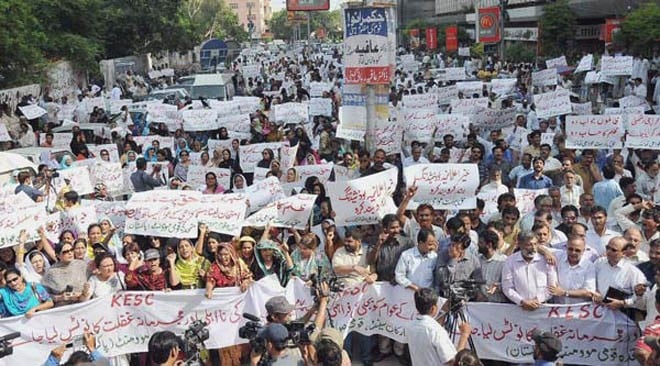
Consumers and the power provider continue to play blame-game over long hours of loadshedding

Afzal Hussain, who runs a tailoring shop in the low-income Landhi area of Karachi, is not happy with the unscheduled loadshedding occurring for the past few weeks.
"Normally, the scheduled loadshedding in our area is seven and a half hours in three spells of 2.5 hours each. But during the brutal heat of summer, there are power outages of 12 to 18 hours. It is ruining our business prior to Eid," says Hussain.
A city of over 23 million, electricity situation in Karachi has become the worst during the summer, especially since the start of the holy month of Ramzan, because of increase in unannounced loadshedding.
Around 70 per cent of the city plunged into darkness for several hours after three major breakdowns within a week. Residents have protested on the roads, burning tires and blocking traffic in the metropolis.
Read also: Plants gone dry
K-Electric, (KE) the main provider of electricity to Karachi, has been under severe pressure from the Sindh government, political parties, judiciary and civil society activists -- mainly because of the unannounced loadshedding.
The power utility, which was Karachi Electric Supply Corporation (KESC) before it was privatised in 2005, is currently supplying 2,500MW of electricity to the city, generated at its five production plants and its share from the national grid.
Leading political parties, especially the Jamaat-e-Islami, have regularly organised sit-ins against power outages for several weeks. "K-Electric is not just tormenting the residents with unannounced loadshedding, it is also looting them through increased tariff, over-billing and fuel adjustment charges," says Hafiz Naeemur Rehman, Karachi chief of the JI.
The civil society activists, including the Citizens Trust Action Crime’s head, Nazim F. Haji, and Pakistan Institute of Labour Education and Research’s executive director, Karamat Ali, went to the court against the KE. On their petition, the Sindh High Court on May 29 ordered the National Electric Power Regulatory Authority (NEPRA) to take action against the KE for prolonged loadshedding and over-billing. Appreciating the Sindh High Court’s verdict, activists called for renationalisation of the power utility.
Haji says residents of Karachi were suffering in the hot weather while the KE was producing less electricity to save fuel in order to mint maximum profits. "The main objective of the private sector management of KE is to maximise their profit. The total installed capacity of KE is sufficient to meet the demand of the entire city," he tells TNS. "Besides its own generation, the National Transmission and Dispatch Company (NTDC) is providing 650 MW to KE, which is almost free," he adds.
The KE officials maintain that in areas where consumers pay their electricity bill, there is hardly any loadshedding. But in some neighbourhoods where the recovery ratio is low, people are experiencing loadshedding of over eight hours.
However, residents of low-income neighbourhoods complain that power supply utility has been punishing them collectively. "Cutting power or increasing the hours of loadshedding in whole areas is in fact collective punishment, which is unfair," says Fazal Hadi, a resident of Shershah area.
Irregular power outages have also caused shortage of water. Officials of Karachi Water and Sewerage Board say that owing to power outage in the pumping stations many areas of the metropolis may not receive water.
On the other side, the KE officials say that people fail to distinguish between loadshedding and technical faults. The KE spokesperson said complaints regarding excessive power shutdown are received but it is not always loadshedding, rather it is technical faults occurring mostly due to over loading.
"There is no extra loadshedding and the maximum duration of loadshedding in any area is 7.5 hours in the city," KE spokesperson tells TNS. "We have categorised areas over non-recovery of bills. 100 per cent recovery areas are exempted from loadshedding while areas with least recovery will have to bear a loadshedding schedule of 7.5 hours."
He said that another reason behind loadshedding is illegal electricity connections, commonly known as kunda system, and some of these areas are ‘no-go areas’ for KE teams. "It has a negative impact on electricity users who pay for their electricity bill," he adds.
Also, on the Sindh High Court orders, an investigation into the power crisis in Karachi has been initiated. According to a Geo TV report, a NEPRA team reached Karachi last week and met KE’s top management. The team also visited Bin Qasim Power Plant and various other installations.
Meanwhile, the Sindh government claims it would start supplying 100MW to KE from the Sindh Nooriabad Power Company, a project of the provincial government, in the next few weeks.